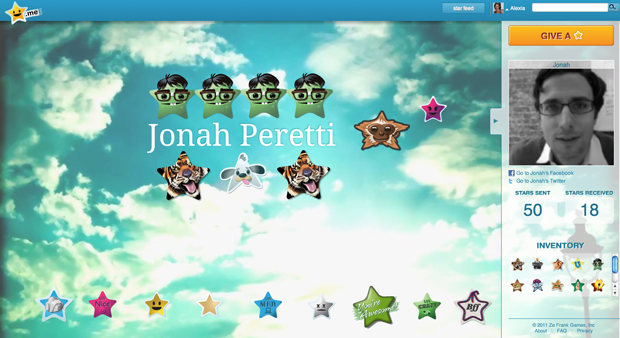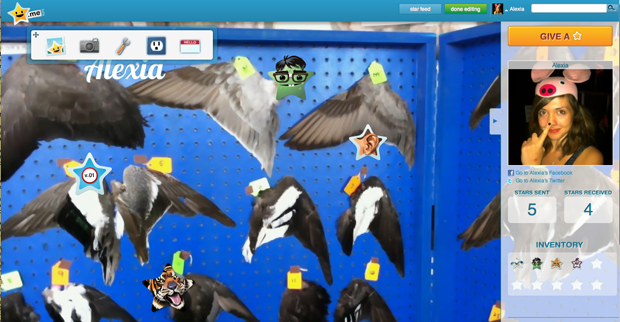
Every once in awhile you come across people who are entirely original, and Ze Frank is one of those people. While many people as eccentric as Frank end up with not so amazing lots in life, Frank, who originally studied Neuroscience at Brown, most recently received $500K from Andreesen Horowitz, Betaworks, Lerer Ventures, Founder Collective, Gary Vaynerchuk and Ron Conway to focus on creating novel social games. Now the world gets to see the fruits of his labor.
Kicking off today in invite-only beta is Frank’s Star.me. Star.me is a social network meets social game based around positive reinforcement, or the action of giving people Stars. The appeal of this is very basic but poignant. At our core we all want to be liked and given validation. Frank calls the game, “A twist on the manifestation of identity as reflected through others.”
Focusing solely on the exchange of virtual goods or Stars that people can display on their profiles, Star.me is unlike anything else you’ve seen. And off-puttingly positive. When asked who his closest competitor was, Frank said social gaming beast Zynga. While granted some of the game mechanics are similar, Star.me and FarmVille couldn’t be further apart. First of all, Star.me follows Frank’s basic tenet of how to get popular on the Internet, “Dance like an idiot and don’t sell anything.”
Zynga, not so much.
On Star.me you, as a consenting adult, can chose to give out themed Stars with messages like “UR CRAZY,” “UR CUTE,” “BFF,” “Frenemy,” “Bromance,” and (!) “Mom Jeans.” Both the actions of giving and receiving Stars cause new and more diverse stars to be unlocked and obviously, more people sending stars in your direction. Your objective is to give and to get others to give to you through a series of transactions, Games People Play style. Sort of like life (Hint hint, things tend towards reciprocity).

A personal Star.me profile is like an About.me splash page with visible signs of how much people like you. It features a collection of things that people have taken the time to give you, that they think represent you. In a direct attempt at connecting virtual goods and human relationships, your profile reveals “Stars sent” and “Stars received” as well as inventory you still have to give. When you click on “Give A Star” in the top right of your dashboard you are presented with a palette of unique options which you can choose to distribute to your friends via auto-populating user names from Star.me, Facebook, Twitter and email.
You can also chose to share your distribution of Stars on Facebook and Twitter and through a permalink. “I love the little squeals of excited in the Buzzfeed office when someone gets a star,” said Buzzfeed co-founder and investor Jonah Peretti about the service.
As of right now, you have to be invited to join Star.me but once in you can invite as many people as you want. If anyone can’t wait and wants an invite, please email me and I’ll send you one, my email is notoriously easy to figure out, especially for tech smarties like yourselves.
“I’m fascinated by simple joy,” says Frank who has chosen this as the sole project and platform of Ze Frank Games. When asked what the ultimate utility of this endeavor was, Frank originally heard “futility” and when I corrected him told me that “What’s the ultimate futility of this endeavor?” would have been a better question.
When I quipped that utility and futility were ultimately the same thing he humored me, “Well, what’s the ultimate utility in the social relationships that you have? Fun, depending on what economics you subscribe to can be a utility or a disutility.” He went on, “It’s a novel idea where people say great things about each other. It’s a lubricant … What Halmark cards are, they make things easy to say… We would be having the same conversation if Star.me was a brand of vodka.”
True.
In terms of future plans, Frank is working on UI issues (“What does 10,000 stars look like?”), tweaking games mechanics, figuring out creative ways to monetize (“Monetizing fun has been the biggest story of the past couple of years”/”Right now we’re focusing on making the experience as awesome as possible”) and figuring out how to give out more Stars, “For some reason we stopped getting gold stars at some age. It’s time to bring them back.”
You can watch Frank’s TED talk below. Because it’s awesome.